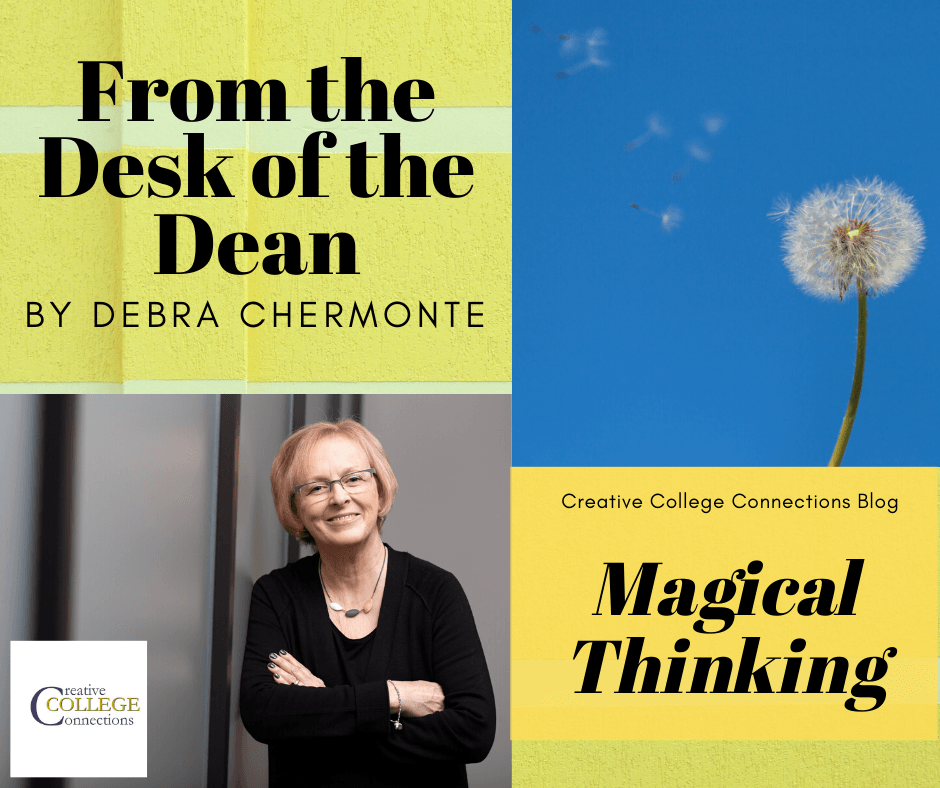Magical Thinking
Is Magical Thinking influencing the college search?
The term Magical Thinking was first used in the field of psychology to describe the way children and some adults falsely believe that their thoughts, wishes, and desires can affect or effect events. Simply put, the Cambridge Dictionary defines Magical (or wishful) Thinking as “the belief that thinking about something or wanting it to happen can make it happen.” At the end of the day some aspects of magical thinking may stay with many of us through adulthood because we want to envision our world as we want it to be, not as it really is.
Parents, you may find your child
engaging in magical or wishful thinking as the search for their college home
evolves. Your child may lock in on a college and proclaim there is only one
place their dreams will be fulfilled--their future destroyed if they are not
admitted. Or, you may plan a trip to visit a college only to have your child
refuse to get out of the car after a brief glimpse out the window. As parents
we need to summon our patience and fortitude and remember that our years of
experience, maturity, and hindsight are not automatically absorbed by our
children. They are living in a world of great anticipation, and yes, sometimes
guided by magical thinking.
I came across some good advice in an article called Living With Your Teenager by DonnaRae Jacobson. Ms. Jacobson points out that by the time a teen is 15-16 years old their egocentric tendencies begin to subside, and most teens are ready to establish a more compassionate relationship with their parents. I hope this is the case in your household, and, if not, may the tide turn soon!
The article points out that:
Adolescents:
●have a longer attention span (30 to 40 minutes) than younger children
●are more willing to try new things
●are better at planning than carrying out the plan
●believe they have the right answer
●are beginning to think in the abstract.
Adults can:
●consistently give their reasons for the limits set
●allow more control in decision making for teens within limits
●give choices and discuss decision making regularly.
Encourage exploration. As you begin to consider colleges, take time as a family to discuss your perspective and your child’s and encourage exploration and wide-ranging ideas even if there are important parameters around cost or other factors to consider. As a former Dean of Admissions and Financial Aid, I recall with great sadness times when a parent cried on the phone about having to disappoint their child because they engaged in magical thinking themselves around the cost of college.
Listen deeply. Parents, listen deeply and hold your child’s opinions in high esteem. Work hard to be the guidepost in the process and not the star. Your child is the centerpiece even as you help to frame their plan for the future. Remember that your child is the one going to college, so the list of colleges that fit their interests and aspirations should be the focus.. As parents, we are often excited and eager to begin researching colleges for our child and before we know it we’ve come up with a list of colleges that “we” are considering. Ideally, we want each student to be invested in their college choice and researching colleges on their own is part of the process.
Know when to step back. Scheduling the details around visiting a college campus often fall to the parent. Admissions representatives understand this, however, from the moment you arrive at the door of the Admissions Office allow your child to take charge by checking in with the receptionist and confirming other details around the visit. It is expected that you too will have questions, however, be sure that your child has the opportunity to make an impression in the presence of college representatives.
While we would all like the college process to flow smoothly, there may be elements of magical thinking for our children and ourselves that appear throughout this unpredictable and complicated journey. I firmly believe that we can diminish some of the weight by letting our children know that they are valued and understood both in moments of joy and disappointment. After all, isn't this what the maturation process is all about?
By Debra Chermonte
Our website is full of information about how we support students. Schedule a complimentary 20-minute Discover Call with Debra here to discuss how she can support your student in the college search and application process.
Debra Chermonte is a national expert in the field of college admissions and counseling with over three decades of experience. Most recently, she led Oberlin College as Vice President and Dean of Admissions and Financial Aid for twenty-eight years.






